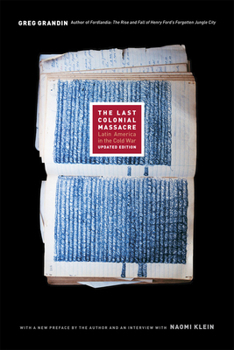The Last Colonial Massacre: Latin America in the Cold War
Select Format
Select Condition 
Book Overview
After decades of bloodshed and political terror, many lament the rise of the left in Latin America. Since the triumph of Castro, politicians and historians have accused the left there of rejecting democracy, embracing communist totalitarianism, and prompting both revolutionary violence and a right-wing backlash. Through unprecedented archival research and gripping personal testimonies, Greg Grandin powerfully challenges these views in this classic work. In doing so, he uncovers the hidden history of the Latin American Cold War: of hidebound reactionaries holding on to their power and privilege; of Mayan Marxists blending indigenous notions of justice with universal ideas of equality; and of a United States supporting new styles of state terror throughout the region. With Guatemala as his case study, Grandin argues that the Latin American Cold War was a struggle not between political liberalism and Soviet communism but two visions of democracy--one vibrant and egalitarian, the other tepid and unequal--and that the conflict's main effect was to eliminate homegrown notions of social democracy. Updated with a new preface by the author and an interview with Naomi Klein, The Last Colonial Massacre is history of the highest order--a work that will dramatically recast our understanding of Latin American politics and the role of the United States in the Cold War and beyond. "This work admirably explains the process in which hopes of democracy were brutally repressed in Guatemala and its people experienced a civil war lasting for half a century."-- International History Review "A richly detailed, humane, and passionately subversive portrait of inspiring reformers tragically redefined by the Cold War as enemies of the state."-- Journal of American History
Format:Paperback
Language:English
ISBN:0226306909
ISBN13:9780226306902
Release Date:July 2011
Publisher:University of Chicago Press
Length:336 Pages
Weight:1.12 lbs.
Dimensions:0.8" x 6.1" x 9.0"
Customer Reviews
1 rating
Invaluable view from Mayan perspective
Published by Thriftbooks.com User , 20 years ago
Many books discuss the violence and political turmoil in Guatemala. What Grandin has done is add a wonderfully distinctive and long-overdue Mayan voice to a terrible history. He describes the May 29, 1978 massacre of approximately 100 Q'eqchi' Indians in Panzos, Alta Verapaz. Grandin profiles a number of Q'eqchi' throughout his book culminating in Mama Maquin, the Q'eqchi' woman leader who was killed attempting to deliver a letter of protest to the local governmental authorities in Panzos. Grandin lays the foundation for the 1978 massacre by going back to the critical events of the 1950s Arbenz adminstration. He describes how the Q'eqchi' were increasingly dispossessed of their land, going from 97 Q'eqchi' in 1888 owning fincas, or large plantations, to just 9 in 1930 and then dropping to none in 1949. (p. 26) After World War I, German immigrants to the Alta Verapaz acquired more and more land. Grandin notes: "Swastikas hung from municipal buildings and flew above German plantations." (pages 24-25.) Perhaps the gem of Grandin's book is a quotation from a portion of Arbenz's sole campaign stop to the Alta Verapaz during the election of 1950. The speech was translated into Q'eqchi' word for word as it was given by Arbenz. Here is an excerpt: "From the time when Alta Verapaz was populated by only the brave Q'eqchi' race until this moment...from the exploitation of the conquistadores' whip to the infamous exploitation of the plantation onwers...they have taken your property, your liberties, your rights...Alta Verapaz workers are the most exploited in all the country. The struggle of the reactionaries, of these 'friends of order' who scowl at us on the street, is to impose this regime on the whole republic. We, in contrast, want to destroy this system. It is not only agrarian reform that will resolve the problem. We need to treat Indians justly..with respect like human beings. We promise you better houses and a better salary. We promise you a little more justice." (p. 44.) Arbenz won the election and instituted land reform that placed hundereds of thousands of acres of previously fallow land in the hands of Mayans. He was deposed in a CIA-sponsored coup in 1954. Grandin shows how that tragic loss of democracy led to the Panzos massacre in 1978, which set the fuse for the explosion of the long-simmering guerilla war and the genocidal military campaign in 1982 of President Rios Montt, who was praised at time by Ronald Reagan as getting a "bum rap" on human rights and being a man of "great integrity." Grandin's book for the first time tells the story of the Q'eqchi' and their quest for justice. Kudos to him.






